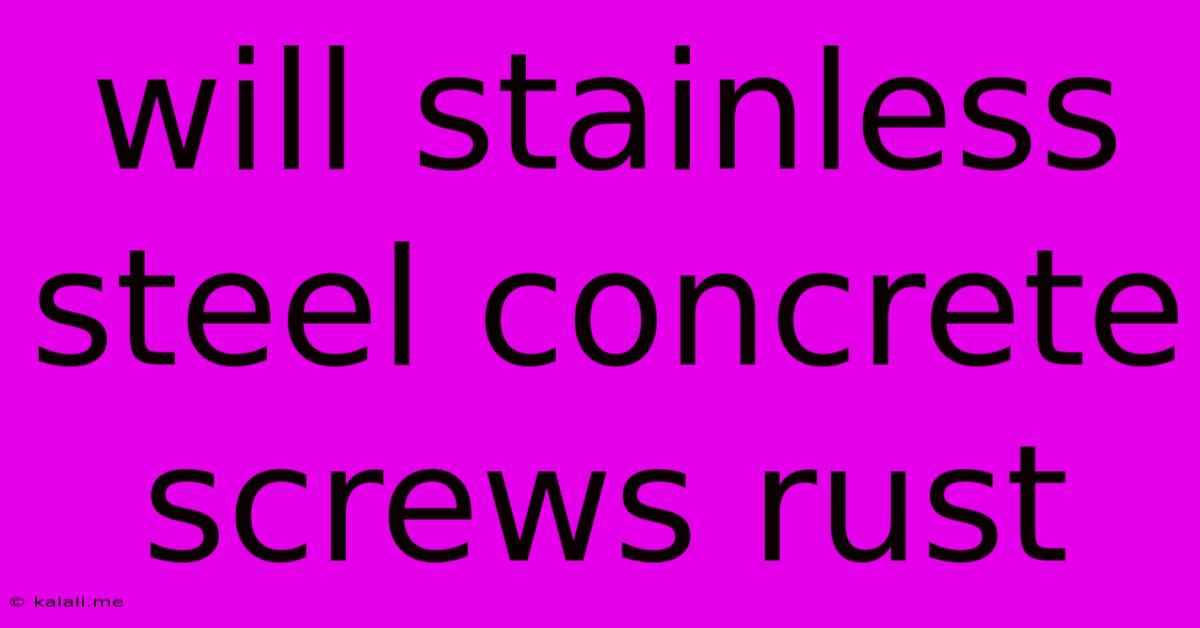Will Stainless Steel Concrete Screws Rust
Kalali
May 30, 2025 · 3 min read

Table of Contents
Will Stainless Steel Concrete Screws Rust? A Comprehensive Guide
Meta Description: Discover the truth about stainless steel concrete screws and rust. This guide explores different grades of stainless steel, their rust resistance, and factors influencing corrosion. Learn how to choose the right screws for your project and ensure long-lasting durability.
Are you planning a construction or DIY project involving concrete and need to know if stainless steel concrete screws will rust? The short answer is: not typically, but it depends. While stainless steel is known for its corrosion resistance, not all stainless steel is created equal. Understanding the nuances of different stainless steel grades and environmental factors is key to selecting the right screws for your project and ensuring long-term durability.
Understanding Stainless Steel Grades
The rust resistance of stainless steel hinges on its composition, specifically its chromium content. Chromium forms a passive oxide layer on the surface, protecting the underlying metal from further oxidation (rust). However, different grades of stainless steel offer varying degrees of corrosion resistance:
- 304 Stainless Steel: This is a common grade known for its good corrosion resistance in many environments. It's suitable for many outdoor applications, but it's not immune to rust in extremely harsh conditions.
- 316 Stainless Steel: Often called "marine grade" stainless steel, this grade contains molybdenum, enhancing its resistance to chloride corrosion (a major cause of rust in coastal areas). It's significantly more resistant to rust than 304 stainless steel.
- 410 Stainless Steel: This grade is less resistant to corrosion than 304 or 316 stainless steel and isn't generally recommended for outdoor or wet applications where rust prevention is critical.
Choosing a higher grade, like 316 stainless steel, is crucial when dealing with environments prone to moisture, salt spray, or harsh chemicals. For projects exposed to significant amounts of water or salt, 316 is the better choice.
Factors Influencing Rusting
Even with high-grade stainless steel screws, several factors can influence their susceptibility to rust:
- Exposure to Chlorides: Saltwater and de-icing salts contain chlorides, which can break down the passive oxide layer, leading to pitting corrosion and ultimately, rust.
- High Humidity and Moisture: Constant exposure to moisture accelerates corrosion, even in high-grade stainless steel.
- Contact with Other Metals: Contact with dissimilar metals can create galvanic corrosion, accelerating rust formation.
- pH Levels: Extremely acidic or alkaline environments can compromise the corrosion resistance of stainless steel.
- Surface Damage: Scratches, abrasions, or other damage to the screw's surface can expose the underlying metal to corrosion.
Selecting the Right Screws for Your Project
To ensure your concrete screws resist rust, consider these points:
- Identify the Environment: Assess the location and environmental conditions where the screws will be used. A harsh marine environment demands 316 stainless steel, while a less aggressive environment might tolerate 304 stainless steel.
- Check the Grade: Always verify that the screws are made of 304 or 316 stainless steel. Reputable manufacturers will clearly indicate the grade on the packaging.
- Proper Installation: Ensure the screws are installed correctly to avoid damage to the protective oxide layer.
Conclusion: Minimizing the Risk of Rust
While stainless steel concrete screws are generally resistant to rust, it's crucial to select the appropriate grade and consider the environmental factors that could affect their longevity. Choosing 316 stainless steel for exposed and harsh environments significantly reduces the risk of corrosion. By understanding these factors and taking preventative measures, you can ensure that your concrete screws remain rust-free for years to come.
Latest Posts
Latest Posts
-
How To Get Duct Tape Residue Off
May 31, 2025
-
Thank You For Your Time And Consideration
May 31, 2025
-
Fallout 4 Nuka World Transit Center
May 31, 2025
-
How To Remove Carpet Glued To Cement
May 31, 2025
-
Lucky For You Or Luckily For You
May 31, 2025
Related Post
Thank you for visiting our website which covers about Will Stainless Steel Concrete Screws Rust . We hope the information provided has been useful to you. Feel free to contact us if you have any questions or need further assistance. See you next time and don't miss to bookmark.